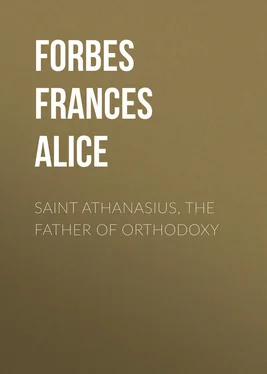Frances Forbes - Saint Athanasius, the Father of Orthodoxy
Здесь есть возможность читать онлайн «Frances Forbes - Saint Athanasius, the Father of Orthodoxy» — ознакомительный отрывок электронной книги совершенно бесплатно, а после прочтения отрывка купить полную версию. В некоторых случаях можно слушать аудио, скачать через торрент в формате fb2 и присутствует краткое содержание. Жанр: foreign_religion, foreign_antique, foreign_prose, на английском языке. Описание произведения, (предисловие) а так же отзывы посетителей доступны на портале библиотеки ЛибКат.
- Название:Saint Athanasius, the Father of Orthodoxy
- Автор:
- Жанр:
- Год:неизвестен
- ISBN:нет данных
- Рейтинг книги:4 / 5. Голосов: 1
-
Избранное:Добавить в избранное
- Отзывы:
-
Ваша оценка:
- 80
- 1
- 2
- 3
- 4
- 5
Saint Athanasius, the Father of Orthodoxy: краткое содержание, описание и аннотация
Предлагаем к чтению аннотацию, описание, краткое содержание или предисловие (зависит от того, что написал сам автор книги «Saint Athanasius, the Father of Orthodoxy»). Если вы не нашли необходимую информацию о книге — напишите в комментариях, мы постараемся отыскать её.
Saint Athanasius, the Father of Orthodoxy — читать онлайн ознакомительный отрывок
Ниже представлен текст книги, разбитый по страницам. Система сохранения места последней прочитанной страницы, позволяет с удобством читать онлайн бесплатно книгу «Saint Athanasius, the Father of Orthodoxy», без необходимости каждый раз заново искать на чём Вы остановились. Поставьте закладку, и сможете в любой момент перейти на страницу, на которой закончили чтение.
Интервал:
Закладка:
Alexander at once resolved to take Athanasius into his household and to bring him up as his own son, an inspiration for which he was often to thank God in the years to come. The boy soon grew to love the gentle and holy Patriarch, who could act with such strength and decision when it was needful for the good of the Church. He was constantly in touch with men of every rank and country, for Alexandria was a city where people of all nations and of all creeds met. Pagans, Jews and Christians lived side by side in their various quarters; there even existed a set of philosophers who tried to make a religion for themselves out of an amalgamation of several others.
Athanasius was still very young when he began to act as secretary to the Patriarch, accompanying him on all his journeys throughout his vast diocese; and he himself tells us how he stayed for a time among the monks in the desert of Egypt and how his young soul was set on fire by the holiness of their lives.
Neither science nor logic nor philosophy offered any difficulty to the brilliant young scholar, whose knowledge of Scripture and of theology was to astonish the men of his time. Alexander himself as he grew older leaned more and more on Athanasius, consulting him, young as he was, on the most important matters. So the years rolled on, and the boy grew into manhood, "gentle and strong," as we are told by one who knew him, "high in prowess, humble in spirit, full of sympathy, angelic in mind and face." That he would make his mark on the world of his time, few who knew him doubted; but of the dauntless soldier-spirit that slumbered behind that gentle mien, of the steadfast will that no human power could shake, they knew but little. God's moment had not yet come.
Chapter 2 ARIUS THE HERESIARCH
THE night before the martyrdom of the Patriarch Peter, as he had lain in prison praying and waiting for that dawn which was to be his last on earth, there had come to him a few of his faithful clergy. They had braved many dangers to look once more upon the face of their beloved Bishop and to obtain his blessing and his last instructions; they had come also to plead for one who had asked their help.
But a short time before, a certain man called Arius had been excommunicated by the Patriarch for having joined the schism of Meletius. He it was who that very day had visited them, beseeching them with tears to use their influence with Peter to obtain his pardon. The clerics knew the tenderness of their Bishop's heart and his readiness to forgive the erring; they were therefore greatly surprised when their petition met with a stern refusal.
"Never," said Peter. "Arius is separated from the glory of the Son of
God both in this world and in the next."
Then, as Achillas and Alexander, his dearest and most intimate friends, had drawn him apart to ask the reason for such unusual severity —
"This night," he said, "as I prayed, Our Lord appeared to me in glory, but His robe was rent from top to bottom. 'Who has treated Thee thus, my Lord!' I cried, 'and rent Thy garments?'
"'It is Arius,' He replied, 'who has torn My robe, and tomorrow they will come to you to intercede for him. Therefore I have warned you to keep him from the fold. But you shall die for Me tomorrow.'"
Then Achillas and Alexander, and they that were with them, prayed once more with their Bishop, and he blessed them and bade them depart in peace. And when the morning came, the promise of Christ was fulfilled, and His faithfu1 servant received the martyr's crown.
Achillas succeeded Peter as Patriarch, and in course of time, yielding to the entreaties of Arius and deceived by his apparent good faith, he received him back into the fold and gave him charge of one of the largest churches in Alexandria in a district called Baukalis.
Tall and striking in appearance, with a certain eloquence and a great pretense of holiness, Arius soon became a popular preacher. He had even hoped, it was said, to succeed Achillas as Patriarch; and when, on the death of Achillas, Alexander was elected to take his place, Arius' anger and envy knew no bounds. Since he could find no fault with the conduct of the new Patriarch, whom everyone acknowledged to be blameless and holy, he proceeded to find fault with his doctrine. "In teaching that Christ was the Eternal Son of God," said the priest of Baukalis, "Alexander and his clergy made a great mistake. Since Christ was the creation of God the Father, how could He Himself be God?"
It was a heresy that struck at the very roots of Christianity. Alexander remembered, too late, the warning of Peter. Gentle and peaceful by nature, he tried at first to win Arius by kindness. "Let him explain his difficulty," he said, "and discuss the question with theologians"; but all such suggestions were met with pride and obstinacy. Arius at last sent a haughty statement of his opinions, which were condemned by nearly all the Bishops of Egypt. He was therefore deposed and forbidden to preach, but he was not the man to take his defeat humbly.
Hastening to Caesarea in Palestine, where he had influential friends, he gave himself out as "the very famous, the much suffering for God's glory, who, taught of God, has acquired wisdom and knowledge." Many were seduced by his insidious persuasions, among them Eusebius, the Bishop of Caesarea in Palestine, who, thoroughly taken in by the deceits and false holiness of the heretic, wrote a letter to Alexander in his favor.
The Patriarch replied by a detailed account of Arius' teaching and his trial, giving the reasons why the Synod had thought fit to depose him. This letter had an effect on the clergy and Bishops of Palestine which Arius was quick enough to see. He therefore retired into Syria, where he made great friends with another Eusebius, the clever and crafty Bishop of Nicomedia, who had gained an unfortunate influence over the Emperor.
It was now nearly twelve years since Constantine, himself a pagan, though the son of St. Helena, had prayed to the God of the Christians to give him the victory over his enemies. His prayers had been heard. In the brightness of the noonday sky there appeared a sign which outshone the sun in splendor – the image of the Cross of Christ. "In this sign thou shalt conquer" was traced in fiery letters across it, and the Emperor and all his army saw and believed.
With the Cross as standard, Constantine marched against his enemies and defeated them. From that day forth he became a catechumen and the protector and friend of the Christians. His first act was to publish an edict, the Edict of Milan, which gave them full liberty to practice their religion, build churches and preach. Thus the Church came forth at last from the dark night of persecution, but her life on earth is ever a warfare against the powers of evil, and other dangers lay ahead.
The Emperor began by making humane laws. He abolished the punishment of crucifixion out of reverence for the Son of God, who had died upon the Cross, put a stop to the cruel games of the arena and bettered the condition of the slaves.
Constantine's nature was really a noble one, but there was much in him still of the pagan and the barbarian. Unfortunately for himself and for the world, he fell under the influence of Eusebius, Bishop of Nicomedia.
This man, who was said to have apostatized during the persecution of Maxentius and who had intruded himself, no one quite knew how, into the See of Nicomedia, had begun by winning the good graces of Constantia, the Emperor's sister. During the time when Constantia's husband, Licinius, was at war with her brother, Eusebius was his staunch friend, upholding him in his rebellion against the Emperor; but on the defeat of Licinius, the Bishop at once transferred his friendship to the conqueror, Constantine. Bishop Eusebius resembled Arius in his want of reverence and of honesty, and had taken Arius' side against the Patriarch, Alexander, praising openly the teaching of Arius and declaring that his only wish was that all men should share his opinions. He had even dared to write in Arius' favor to the Patriarch, declaring insolently that he had been unjustly deposed.
Читать дальшеИнтервал:
Закладка:
Похожие книги на «Saint Athanasius, the Father of Orthodoxy»
Представляем Вашему вниманию похожие книги на «Saint Athanasius, the Father of Orthodoxy» списком для выбора. Мы отобрали схожую по названию и смыслу литературу в надежде предоставить читателям больше вариантов отыскать новые, интересные, ещё непрочитанные произведения.
Обсуждение, отзывы о книге «Saint Athanasius, the Father of Orthodoxy» и просто собственные мнения читателей. Оставьте ваши комментарии, напишите, что Вы думаете о произведении, его смысле или главных героях. Укажите что конкретно понравилось, а что нет, и почему Вы так считаете.












